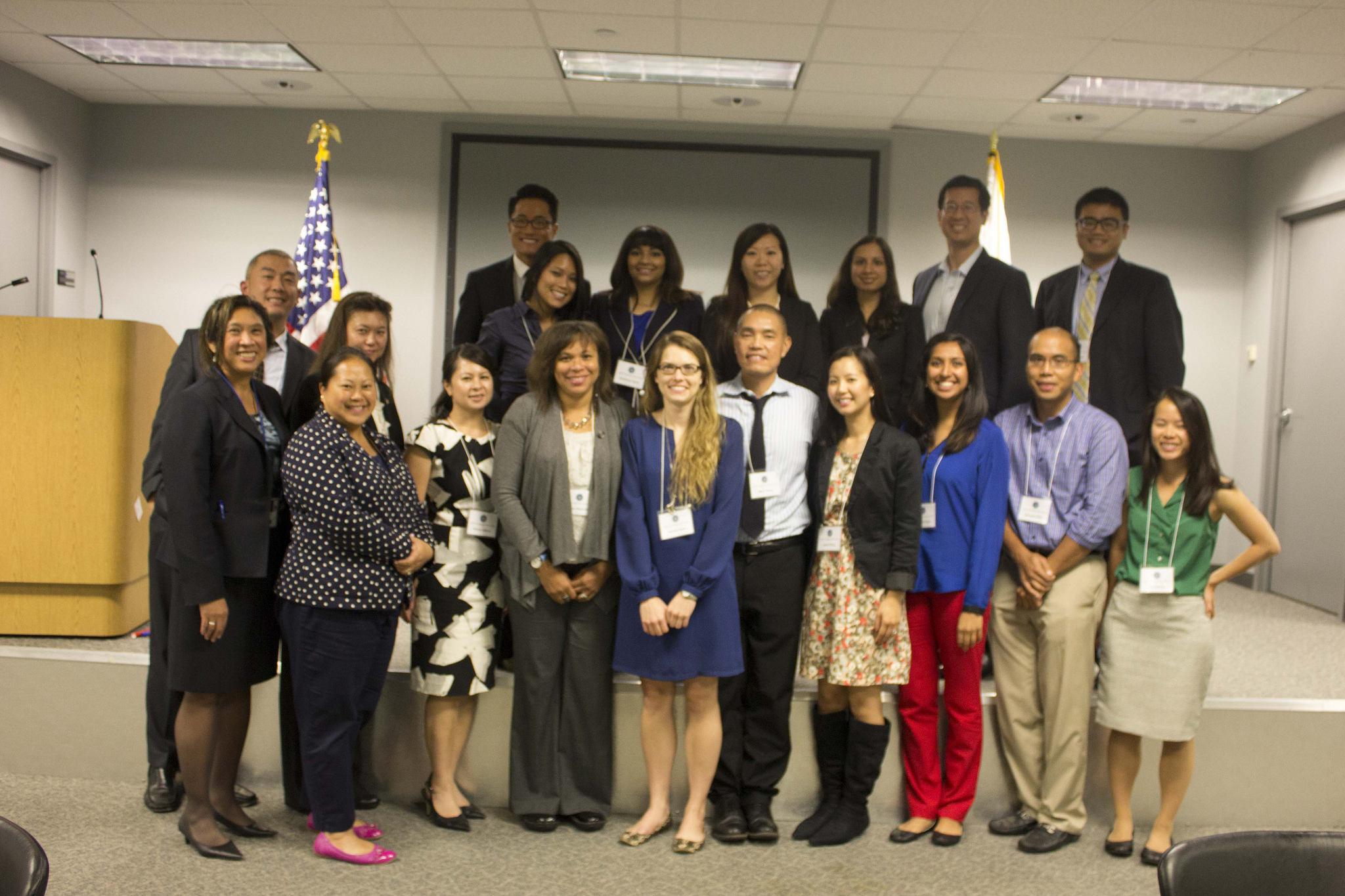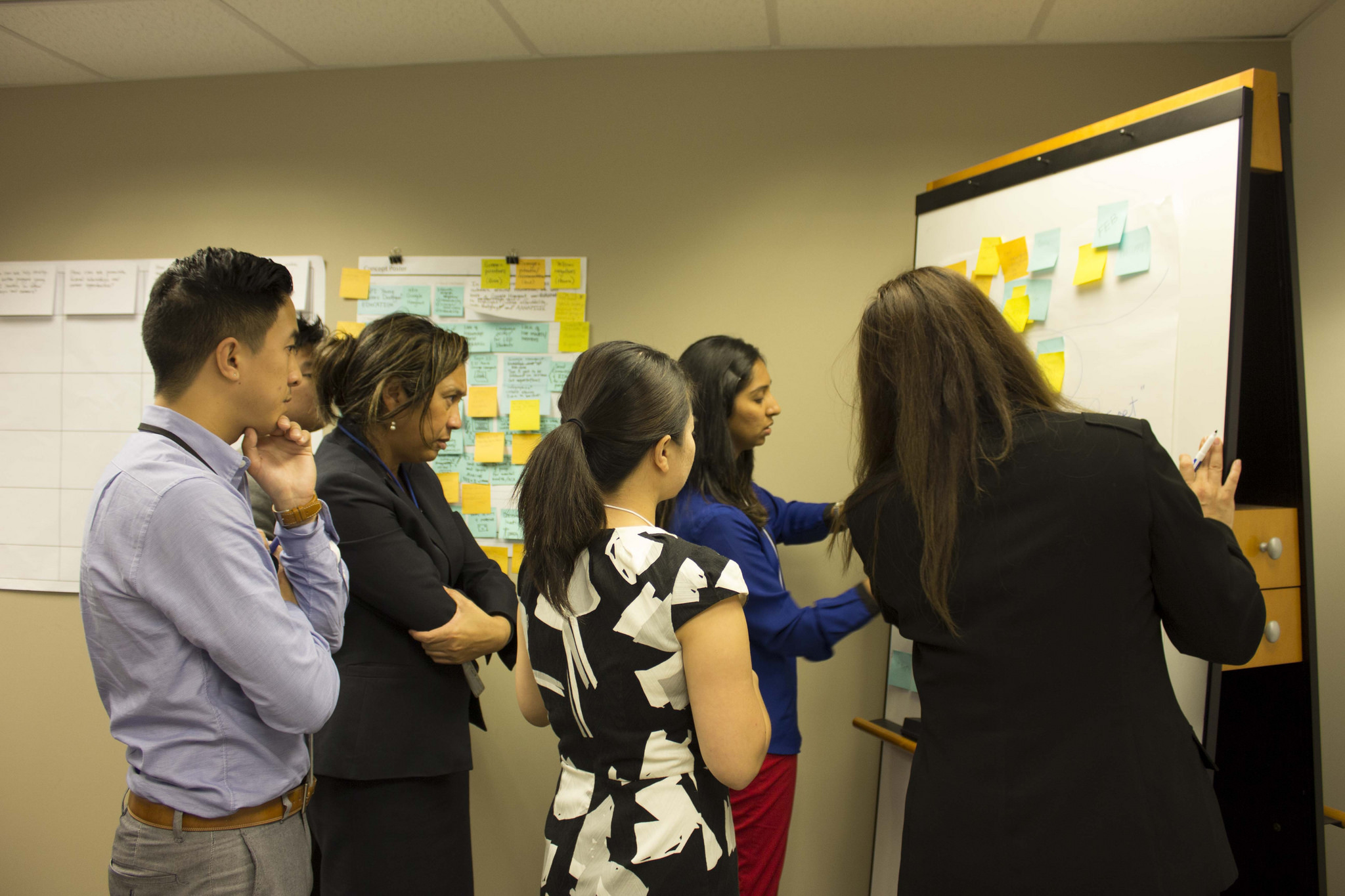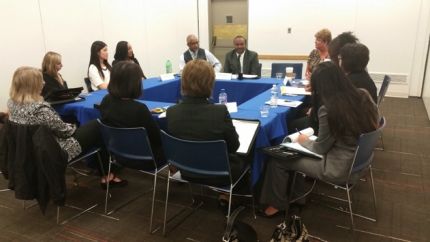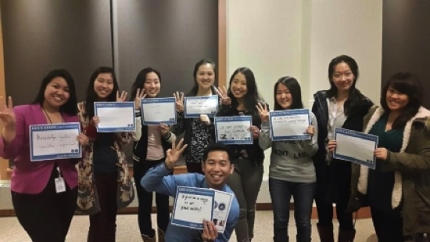Initiative on Asian Americans and Pacific Islanders Blog
Addressing the Needs of Asian Americans and Pacific Islanders in Des Moines
Posted by on November 19, 2014 at 9:30 AM ESTOn October 28, 2014, the Region 7 Interagency Working Group, in partnership with the Iowa Department of Human Rights and Drake University, hosted its first community roundtable in Des Moines, IA.
Professor David Skidmore of Drake University and San Wong from the Iowa Department of Human Rights opened the event to welcome federal representatives and community leaders to the roundtable. Federal agency members from the Social Security Administration, Department of Health and Human Services, U.S. Citizenship and Immigration Services (USCIS), Small Business Administration, Department of Housing and Urban Development, Department of Labor’s Wage and Hour Division, Department of Labor’s Occupational Safety and Health Administration, U.S. Equal Employment Opportunity Commission, and the International Trade Administration shared their experiences working with the AAPI community and the wealth of resources, programs, and services their agencies and offices offered. Community members voiced key issues challenging the AAPI community in this region, learned about available federal tools for addressing their needs, and connected with federal officials from agencies across the board.
Learn more aboutKicking Off the Conversation with WHIAAPI’s Young Leaders Dialogue on Education
Posted by on November 19, 2014 at 9:30 AM ESTOn October 30, the White House Initiative on Asian Americans and Pacific Islanders (WHIAAPI) held its first Young Leaders Dialogue (YLD) Google+ Hangout on Education. This is the first of four YLDs happening in conjunction with the E3! Ambassadors Program, comprised of 34 young leaders across the nation committed to increasing opportunity and improving the quality of life for AAPIs. These E3! Ambassadors aim to “Educate, Engage and Empower” young leaders, by highlighting federal programs and resources for AAPIs around the issues of education, mental health, pathways to public service and Deferred Action for Childhood Arrivals (DACA).
The first YLD focused on the topic of education in an interactive Google+ Hangout. Over 500 students and professionals RSVP’d and attended watch parties hosted by E3! Ambassadors across the nation, followed by small group discussions focused on the needs of various campuses and communities. Throughout the event, participants were able to take part in a photo campaign and explain why education matters to them. During the Google+ Hangout, WHIAAPI senior advisor Akil Vohra discussed eligibility for Asian American and Native American Pacific Islander-Serving Institutions (AANAPISIs), and how students can encourage university administrators to apply for funding for Minority-Serving Institutions (MSIs). Maulik Pancholy, a member of the President’s Advisory Commission on AAPIs, shared his personal story, and discussed important anti-bullying resources. Monica Thammarath, a community leader with the National Council of Asian Pacific Americans (NCAPA), highlighted efforts within the community to increase college affordability and access to quality education.
YLDs are a way for young leaders to learn about federal resources available around issues that affect them, and share their personal stories. Each dialogue features Administration officials, community leaders, and other experts on the topic and can provide valuable information to increase access and opportunity for young AAPIs.
To find ways to engage your community around these issues, check out our education toolkit, and stay tuned for our upcoming Young Leaders Dialogue on Mental Health in December!
Jason Tengco is a Senior Advisor at the White House Initiative on Asian Americans and Pacific Islanders.
Learn more about EducationStrengthening the AAPI Community Through New Bullying Prevention Efforts
Posted by on November 18, 2014 at 9:30 AM EST
Hines Ward, retired NFL wide receiver and former member of the President’s Advisory Commission on Asian Americans and Pacific Islanders, shares his story on bullying.More than one-quarter of students between the ages of 12 and 18 reported being bullied at school during the 2010-11 school year — nearly 7 million students. Some Asian American and Pacific Islander (AAPI) students face bullying and harassment based on their immigration status, such as Micronesian students whose families have recently immigrated to the continent and Hawaii. Others are bullied for the way they look, such as turbaned Sikh youth, or for their English language skills.
Bringing Health Equity and the Affordable Care Act to AAPIs in New York
Posted by on November 15, 2014 at 9:00 AM ESTWith the next open enrollment period for the Health Insurance Marketplace to begin Saturday, November 15 and continuing through February 15, 2015, community leaders in Region 2 held a series of events to raise awareness among Asian Americans and Pacific Islanders (AAPIs).
On October 28, the White House Initiative on Asian Americans and Pacific Islanders (WHIAAPI) joined AAPI community leaders and federal partners in an invaluable dialogue on advancing health equity during the 7th Biennial Asian American Native Hawaiian and Pacific Islander Health Conference hosted by the New York University (NYU) Center for the Study of Asian American Health, Asian & Pacific Islander American Health Forum (APIAHF), and NYU School of Medicine. During this conference, community leaders spent the day in engaging workshops and panel discussions focused on efforts to advance health equity for AAPIs. Dr. Tung Nguyen, Chair of the President’s Advisory Commission on AAPIs, and I spoke about WHIAAPI’s efforts to address health equity concerns for AAPI communities.
The next day, on October 29, the Centers for Medicare & Medicaid Services and WHIAAPI’s Region 2 Regional Interagency Working Group hosted a conference on the Affordable Care Act, “Transforming Health Systems for AAPI Communities: New Options in Health Careers.” Commissioner Kathy Ko Chin emphasized that access to health care is vital to individuals and communities, and underscored the importance of sharing stories as a means of educating the AAPI community about available health care services.
Kathy then shared the story of Bishnu, a hard-working social worker in Philadelphia who had gone years without access to consistent health care. In addition to being originally deterred from health care enrollment based on cost, Bishnu struggled to navigate the system in her native tongue. However, thanks to the Affordable Care Act and a dedicated in-person assister, Bishnu received financial assistance that allowed her to afford her health care insurance. Kathy reminded the audience that Bishnu is a representative of thousands of AAPIs who have benefitted from the Affordable Care Act. Kathy also underscored various ways to get involved with the Affordable Care Act, such as utilizing trusted resources, building partnerships across communities and sectors, and spreading the word to your families and friends using any and all outlets.
Throughout the day, federal and community leaders highlighted assistance available by health navigators -- individuals or organizations trained to help consumers as they look for health coverage -- and the expansion of health career opportunities. The conference ended with closing remarks by Commissioner Maulik Pancholy, who highlighted WHIAAPI’s youth engagement efforts, including the E3! Ambassadors Program, bullying prevention, and opportunities in public service.
Both events in New York reaffirmed and highlighted the ongoing health care needs and struggles of Asian Americans, Native Hawaiians, and Pacific Islanders, while also highlighting new opportunities to improve health outcomes for AAPIs through the Affordable Care Act. WHIAAPI is committed to continuing to ensure that access to health care is a reality for AAPIs as open enrollment of the Health Insurance Marketplace begins on November 15.
Christine Soyong Harley is Senior Policy Advisor for the White House Initiative on Asian Americans and Pacific Islanders.
Learn more about Health CareChallenge By Design: Working to Strengthen Government
Posted by on November 14, 2014 at 7:38 PM EST
Twenty-four federal staff members were selected from 180 applicants to comprise the 2014-2015 cohort of the FAPAC Challenge Teams (photo by WHIAAPI).
The challenges facing the federal government today are myriad and complex. To successfully meet them, federal government leaders must be creative and innovative; flexible and resilient; cooperative and collaborative. They must be able to work in effective teams, value individual differences, and leverage diversity to think strategically and solve concrete problems.
To develop these skills in federal employees who have limited opportunities to train, go on details, or work on special assignments, the Federal Asian Pacific American Council (FAPAC) created the “Challenge Team” program. The FAPAC Challenge Team is a cost-neutral, project-oriented, innovative and experiential training-based program that gives federal employees, especially those at the GS-9 to GS-14 levels, the chance to develop leadership skills while working on significant and challenging projects, without having to leave their agencies on detail assignments or temporary duties.
With participation from the White House Initiative on Asian Americans and Pacific Islanders (WHIAAPI), the U.S. Office of Personnel Management (OPM), and the U.S. Equal Employment Opportunity Commission (EEOC), FAPAC launched the program with its first class in July 2013 during the WHIAAPI Federal Employee Conference.
Following the tremendous success with the first class, FAPAC launched its second class of Challenge Team at the 2014 Federal Employee Conference and held its kickoff meeting on October 14 in Washington, DC. Twenty-four federal staff members were selected from 180 applicants to comprise the 2014-2015 cohort of the FAPAC Challenge Teams. These federal employees are divided into four teams that are responsible for tackling issues surrounding language access, capacity building, data disaggregation, and workforce diversity. They will use principles of design thinking in order to address these longstanding issues in a fresh, creative, and innovative way. Each team has representation from agencies across the federal government and hail from different regions of the country, ensuring that diverse perspectives and experiences are included in this process.

During a kickoff meeting, participants in the 2014 Federal Asian Pacific American Council (FAPAC) Challenge Teams work together on a human-centered design activity in Washington, DC, October 14, 2014 (photo by WHIAAPI).
The FAPAC Challenge Team program offers participants a unique opportunity to get involved on the hard-hitting issues that affect AAPI communities around the country. It is also an opportunity for federal workers to gain valuable professional development and experience to take with them as they continue advancing in their careers. Each team will spend the next six months working together to analyze issues and produce impactful solutions that federal agencies can incorporate in order to ensure that agencies are able to better deliver their services and programs. You can find out more about this program at: www.fapac.org/challengeteams.
We look forward to working with the Challenge Team participants to help the federal government rise and meet the challenges of the twenty-first century.
Doua Thor is Senior Advisor at the White House Initiative on Asian Americans and Pacific Islanders. Stephen Yim is Advisor at the White House Initiative on Asian Americans and Pacific Islanders.
November 20 Webinar: Collecting and Using Hepatitis B Screening Data for Research and Policy
Posted by on November 14, 2014 at 5:02 PM ESTPlease join Hep B United and the White House Initiative on Asian Americans and Pacific Islanders on Thursday, November 20, 2014 at 3:00-4:00 PM EST for a webinar on Collecting and Using Hepatitis B Screening Data for Research and Policy featuring expert speakers and researchers in viral hepatitis.
Hepatitis B affects up to two million Americans – yet the disease is often overlooked and largely underdiagnosed. Collecting more data is critical for framing policy and prioritizing hepatitis B via increased funds for research and programs. Join us for this interactive session to learn more about the process of collecting screening data and contributing to research and knowledge. Speakers will discuss best practices for data collection at community-based hepatitis B screening settings, applying for Institutional Review Board approval, and managing and publishing hepatitis B data.
Date: Thursday, November 20, 2014
Time: 3:00 PM - 4:00 PM EST
Register at: http://bit.ly/november20
- A confirmation email with information on how to join the webinar will be sent to you after you register.
Moderator: Kate Moraras, MPH, Senior Program Director, Hepatitis B Foundation and Director, Hep B United
Speakers:
- Chris Harley, MPP, Senior Policy Advisor, White House Initiative on Asian Americans and Pacific Islanders
- Karen E. Kim, MD, MS, Professor of Medicine, University of Chicago and Board President, Asian Health Coalition
- Chari Cohen, MPH, DrPH(c), Director of Public Health, Hepatitis B Foundation
- Amy Jessop, PhD, MPH, Associate Professor, University of the Sciences; Executive Director, HepTREC (Hepatitis Treatment, Research and Education Center)
Note: This webiner is off the record and not for press purposes.
- &lsaquo previous
- …
- 6
- 7
- 8
- 9
- 10
- 11
- 12
- 13
- 14
- …
- next &rsaquo
White House Blogs
- The White House Blog
- Middle Class Task Force
- Council of Economic Advisers
- Council on Environmental Quality
- Council on Women and Girls
- Office of Intergovernmental Affairs
- Office of Management and Budget
- Office of Public Engagement
- Office of Science & Tech Policy
- Office of Urban Affairs
- Open Government
- Faith and Neighborhood Partnerships
- Social Innovation and Civic Participation
- US Trade Representative
- Office National Drug Control Policy
categories
- AIDS Policy
- Alaska
- Blueprint for an America Built to Last
- Budget
- Civil Rights
- Defense
- Disabilities
- Economy
- Education
- Energy and Environment
- Equal Pay
- Ethics
- Faith Based
- Fiscal Responsibility
- Foreign Policy
- Grab Bag
- Health Care
- Homeland Security
- Immigration
- Innovation Fellows
- Inside the White House
- Middle Class Security
- Open Government
- Poverty
- Rural
- Seniors and Social Security
- Service
- Social Innovation
- State of the Union
- Taxes
- Technology
- Urban Policy
- Veterans
- Violence Prevention
- White House Internships
- Women
- Working Families
- Additional Issues


